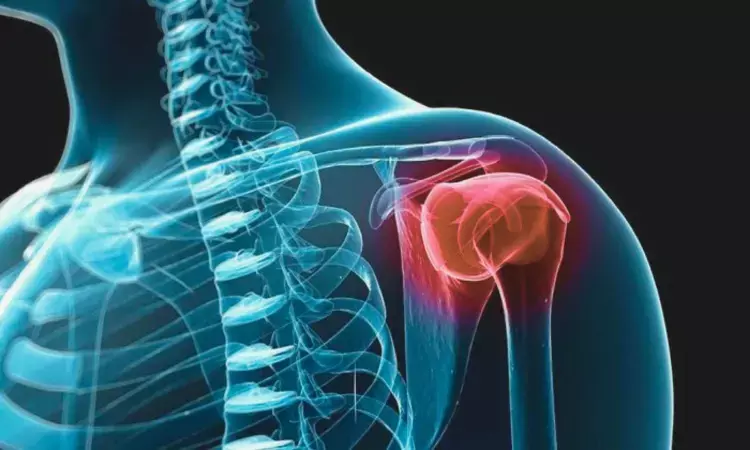- Home
- Medical news & Guidelines
- Anesthesiology
- Cardiology and CTVS
- Critical Care
- Dentistry
- Dermatology
- Diabetes and Endocrinology
- ENT
- Gastroenterology
- Medicine
- Nephrology
- Neurology
- Obstretics-Gynaecology
- Oncology
- Ophthalmology
- Orthopaedics
- Pediatrics-Neonatology
- Psychiatry
- Pulmonology
- Radiology
- Surgery
- Urology
- Laboratory Medicine
- Diet
- Nursing
- Paramedical
- Physiotherapy
- Health news
- Fact Check
- Bone Health Fact Check
- Brain Health Fact Check
- Cancer Related Fact Check
- Child Care Fact Check
- Dental and oral health fact check
- Diabetes and metabolic health fact check
- Diet and Nutrition Fact Check
- Eye and ENT Care Fact Check
- Fitness fact check
- Gut health fact check
- Heart health fact check
- Kidney health fact check
- Medical education fact check
- Men's health fact check
- Respiratory fact check
- Skin and hair care fact check
- Vaccine and Immunization fact check
- Women's health fact check
- AYUSH
- State News
- Andaman and Nicobar Islands
- Andhra Pradesh
- Arunachal Pradesh
- Assam
- Bihar
- Chandigarh
- Chattisgarh
- Dadra and Nagar Haveli
- Daman and Diu
- Delhi
- Goa
- Gujarat
- Haryana
- Himachal Pradesh
- Jammu & Kashmir
- Jharkhand
- Karnataka
- Kerala
- Ladakh
- Lakshadweep
- Madhya Pradesh
- Maharashtra
- Manipur
- Meghalaya
- Mizoram
- Nagaland
- Odisha
- Puducherry
- Punjab
- Rajasthan
- Sikkim
- Tamil Nadu
- Telangana
- Tripura
- Uttar Pradesh
- Uttrakhand
- West Bengal
- Medical Education
- Industry
Positive Outcomes for Rotator Cuff Healing with Bioinductive Collagen Implant, but Adhesive Capsulitis Raises Concerns: Study

USA: A recent systematic review published in Arthroscopy Journal has shed light on the potential benefits of Bioinductive Collagen Implants (BCI) for improving healing outcomes in rotator cuff repairs.
According to published results, for patients with rotator cuff tears, using a bioinductive collagen implant for augmentation may lead to favorable results, including low retear rates and enhanced tendon thickness. Despite the promising findings, the review also noted some concerns regarding the use of BCIs. One significant issue raised was the increased incidence of adhesive capsulitis, commonly known as frozen shoulder, among patients treated with the implant.
"Our data revealed low retear rates in patients treated with BCI, indicating that the implant may effectively aid the healing process. Additionally, the review emphasized a substantial increase in tendon thickness following implantation, which is essential for achieving optimal tendon recovery," the researchers explained.
Eoghan T. Hurley, Department of Orthopaedic Surgery, Duke University, Durham, North Carolina, USA, and colleagues conducted the study to systematically review the literature to assess clinical studies on bioinductive collagen implants for treating rotator cuff tears.
For this purpose, the researchers conducted a literature search in MEDLINE, Embase, and the Cochrane Library following the Preferred Reporting Items for Systematic Reviews and Meta-Analyses (PRISMA) guidelines. They included clinical studies that reported on the use of bioinductive collagen implants (BCI) for rotator cuff tears. Both quantitative and qualitative data were assessed during the review.
A total of 21 studies were included in the review. Based on the review, the researchers revealed the following findings:
- Among patients with full-thickness tears, 7 of the eight studies that assessed pre- and postoperative ASES scores reported statistically significant improvements, with 75% to 100% of patients achieving the Minimum Clinically Important Difference (MCID).
- For those with partial-thickness tears, 7 of the eight studies also demonstrated statistically significant improvements in ASES scores, with 54.4% to 100% of patients meeting the MCID.
- In studies that measured increases in tendon thickness, reported enhancements ranged from 13% in cases of 44% full-thickness tears to 14% to 60% in partial-thickness tears.
- Six studies evaluated re-tear rates in the full-thickness cohort after BCI treatment, with reported rates varying from 0% to 9%.
- Five studies examined re-tear rates in the partial-thickness cohort, which ranged from 0% to 18%.
- Two studies indicated that BCI treatment was cost-effective, yielding savings of $5,338 to $13,061 per healed rotator cuff tendon due to enhanced tendon healing.
The literature on augmenting rotator cuff tears with bioinductive collagen implants (BCI) consistently demonstrates positive outcomes, as reported by the authors. Evidence indicates low retear rates and a notable increase in tendon thickness associated with BCI use, supported by two randomized controlled trials that highlight improved tendon healing. However, the authors also noted a concerning trend of higher rates of adhesive capsulitis in patients treated with BCI.
Reference:
Hurley ET, Twomey-Kozack J, Doyle TR, Meyer LE, Meyer AM, Lorentz SG, Bradley KE, Dickens JF, Klifto CS. Bioinductive Collagen Implant Has Potential To Improve Rotator Cuff Healing - A Systematic Review. Arthroscopy. 2024 Sep 24:S0749-8063(24)00744-8. doi: 10.1016/j.arthro.2024.09.028. Epub ahead of print. PMID: 39326569.
Dr Kamal Kant Kohli-MBBS, DTCD- a chest specialist with more than 30 years of practice and a flair for writing clinical articles, Dr Kamal Kant Kohli joined Medical Dialogues as a Chief Editor of Medical News. Besides writing articles, as an editor, he proofreads and verifies all the medical content published on Medical Dialogues including those coming from journals, studies,medical conferences,guidelines etc. Email: drkohli@medicaldialogues.in. Contact no. 011-43720751


